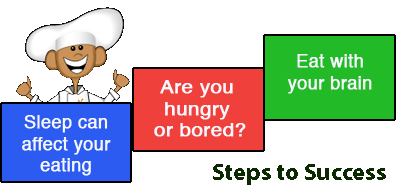
Parents who are invested in providing good nutrition for their families often are concerned with promoting positive body image in their children. This article highlights how parents can help ensure that their children grow up feeling good about their bodies.
Girls and boys will pick up on their parents' frustration with the "battle of the bulge" and therefore think that it is normal to be dissatisfied or hopeless about their own bodies. Children are more likely to develop a positive body image when they see their parents choose exercise over inactivity and contentment rather than contempt for their bodies.
Positive body image develops when parents focus on what their children's bodies can do rather than how they look. Action comments can be directed at flexibility, strength, endurance, persistence, or any other admirable aspect of performance. "You ran hard in the game today," or "You are riding your bike without training wheels; you must be proud of your balance." Even a compliment about how a child is dressed or groomed can be focused on effort: "I can tell you took a lot of time to style your hair tonight; it really shows." 
Children learn to trust their bodies when parents demonstrate trust. When children eat nutritiously and exercise regularly parents can trust that their bodies will develop normally. It is natural for girls to gain weight at puberty. This weight gain is necessary to support menstruation. When parents panic about natural weight changes, teens pick up on it: body image or eating disorders can result. On the other hand, when fathers and mothers trust nature, they can assure their daughters that weight gain in early adolescence is temporary and soon growth will occur to even things out. They can assure their sons who might not be developing muscle at the rate they want that growth will occur in time.
Parents can teach children to be discriminating consumers of the messages that they receive from media. Movies, television shows, music videos, and advertisements present an idealized body that few can achieve. Studies show that boys and girls often feel badly about the way they look after viewing such images. Parents can help prevent body dissatisfaction by teaching their children and teens to be more objective consumers of media messages: how colors, lines, forms, sounds and slogans can persuade. Teens can become more critical of how they might be manipulated by media and even organize campaigns to fight back. The website www.about-face.org might provide a starting place for teens and parents to discuss media portrayals and body image.
We live in a society that is image-obsessed, where body dissatisfaction occurs frequently. Parents can help kids develop healthy body attitudes by paying attention to their own body image, focusing body comments on action, trusting nature, and developing media literacy.
Healthy Eating

Healthy Foods
Healthy Child
Psychology To Healthier Eating
See All Our Nutrition Articles
0 Comments